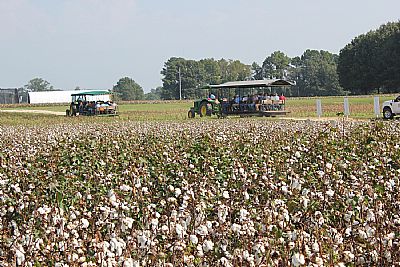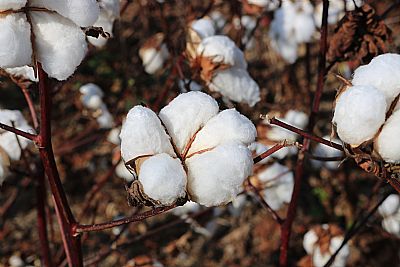

Cotton is the driving economic force for many rural communities in West Tennessee, and historically, the prosperity of this area has depended on cotton. Even in years when cotton acres decline due to weather or high grain prices, to many local producers this crop is still “King.”
Researchers at the West Tennessee Research & Education Center identify high yielding varieties and determine management strategies that will produce consistency in cotton production; key steps in improving the profitability and sustainability of Tennessee cotton.
Related Research Articles
- Sulfur Fertilization and Sulfur Sufficiency Range for Contemporary Cotton Cultivars with High Yielding Potentials (2019)
- Thirty-four Years of No-Tillage and Cover Crops Improve Soil Quality and Increase Cotton Yield in Alfisols, Southeastern USA (2019)
- Effects of Optical Sensing Based Variable Rate Nitrogen Management on Yields, Nitrogen Use and Profitability for Cotton (2019)
- First Transgenic Trait for Control of Plant Bugs and Thrips in Cotton (2018)
- Honey Bee Survival and Pathogen Prevalence: From the Perspective of Landscape and Exposure to Pesticides (2018)
- Effects of Transgenic Bacillus thuringiensis Cotton on Insecticide Use, Heliothine Counts, Plant Damage and Cotton Yield: A Meta-analysis (2018)
- Field Study Investigating Cry51Aa2.834_16 in Cotton for Control of Thrips and Tarnished Plant Bugs (2018)
- Potential Interaction of Pre-emergence Herbicides and the Efficacy of Insecticide and Fungicide Seed Treatments in Cotton (2017)
For additional resources visit:
Current UT Research Projects at WTREC are…
- Evaluating new herbicide trait technology
- Determining financial feasibility of variable rate irrigation system
- Evaluating the effects of new foliar fertilizer products
- Optimizing nitrogen and irrigation timing rates at each growth stage
- Developing sound control strategies for glyphosate resistant weeds in cotton
- Finding the effectiveness of foliar-applied potassium and whether it can overcome K-deficiency symptoms due to low soil moisture
- Evaluating the efficacy and relative value of seed treatments
- Providing farmers fertilization application guidelines to correct S and Zn deficiencies in cotton
- Providing weed management information to cotton growers
- Determining impact of at-planting and in-season insecticide applications on insect populations and yield
- Testing yield response of cotton to irrigation
- Evaluating agronomic performance of cotton to different plant growth regulators, defoliants and fertility regimes
- Evaluating cover crops and tillage on cotton production
